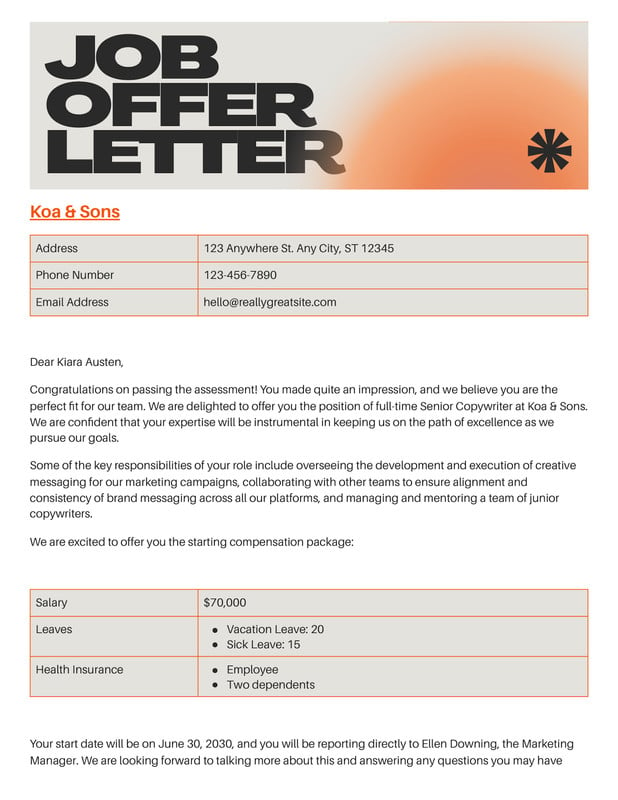Negotiating A 'Best And Final' Job Offer: Is It Possible?

Table of Contents
Understanding the "Best and Final" Offer Strategy
The phrase "best and final offer" is a common tactic used by employers to signal the conclusion of salary negotiations. From the employer's perspective, it indicates their final offer, implying no further concessions are possible. They might use this tactic for several reasons:
- Employer's desire to close the deal quickly: They may have a tight deadline to fill the position and want to avoid prolonged negotiations.
- Budget constraints: The company may have a fixed budget for the role, making further increases impossible.
- A belief that the candidate is their top choice: They might believe you're their ideal candidate and are less willing to negotiate further.
- Avoidance of protracted negotiations: Lengthy negotiations can be time-consuming and resource-intensive for HR and hiring managers.
However, even if an employer presents a "best and final" offer, being inflexible can have downsides. They risk losing a highly qualified candidate if their offer isn't competitive enough in the current job market.
Analyzing Your Position Before Responding
Before responding to a "best and final" job offer, carefully assess your position. This involves a thorough self-assessment and an evaluation of the employer's needs.
- Self-assessment: Consider your skills, experience, market value, and the demand for your skillset. Are you a highly sought-after candidate with in-demand skills? Your leverage will be stronger if you are.
- Company needs: How desperate is the company to fill the role? If they're facing a critical staffing shortage, you have more room to negotiate.
- Full compensation package: Don't just focus on the base salary. Analyze the entire package, including benefits (health insurance, retirement plan, paid time off), bonuses, stock options, or other perks.
Before making a decision, take these steps:
- Review competing offers: If you have other job offers, use them as leverage.
- Research salary benchmarks: Use online resources like Glassdoor or Salary.com to research salary ranges for similar roles in your geographic location.
- Consider your financial needs: Determine your minimum salary requirements to meet your financial goals.
Strategies for Negotiating a "Best and Final" Offer
Even when faced with a "best and final" offer, there are strategies you can employ to potentially improve the terms:
- Subtly question the "finality": Instead of directly challenging the "best and final" label, ask clarifying questions about specific components of the offer. For example, "While I appreciate this offer, could we discuss the bonus structure in more detail?" or "I'm very interested in this opportunity, but the benefits package isn't quite aligned with my expectations. Would it be possible to review these elements?"
- Highlight your value: Reiterate your key skills and accomplishments, focusing on how you exceed the job requirements and bring significant value to the company. Quantify your achievements whenever possible.
- Propose alternative solutions: Instead of demanding a higher salary, suggest alternative solutions that benefit both parties. This could include:
- Flexible work arrangements: Negotiate for remote work options or a flexible schedule.
- Professional development opportunities: Request a budget for attending conferences or taking relevant courses.
- A signing bonus: Propose a one-time payment to incentivize your acceptance.
- Maintain a positive relationship: Use a professional and respectful tone throughout the negotiation process. Maintain a positive relationship with the recruiter or hiring manager. Burning bridges is rarely beneficial.
Remember: Patience and diplomacy are crucial during this stage. Setting a reasonable deadline for your response gives you time to consider your options.
When to Walk Away from a "Best and Final" Offer
Knowing when to walk away is just as important as knowing how to negotiate. Sometimes, a "best and final" offer is genuinely non-negotiable. You should walk away if:
- The offer significantly falls below your minimum salary requirements.
- You identify serious red flags indicating a poor company culture or management practices (e.g., inconsistent communication, dismissive behavior, unrealistic expectations).
- Your gut feeling tells you the offer isn't right for you.
Consider these red flags:
- Unrealistic deadlines or expectations during the interview process.
- Negative feedback from current or former employees.
- Inconsistencies in the information provided by the company.
Remember, accepting a job offer should be a mutually beneficial decision. Don't compromise your self-respect or long-term career goals for a less-than-ideal offer.
Conclusion: Successfully Navigating "Best and Final" Job Offers
Negotiating a "best and final" job offer requires careful preparation, strategic communication, and a clear understanding of your worth. By analyzing your position, highlighting your value, and proposing alternative solutions, you can significantly increase your chances of securing a more favorable compensation package, even when faced with what seems like a non-negotiable offer. Remember, while a "best and final" offer often signifies the end of the formal negotiation process, skillful negotiation can still lead to positive outcomes. Don't let a "best and final" job offer dictate your future; learn how to successfully negotiate even when faced with this common tactic. Learn more about effectively negotiating job offers and increase your chances of securing the best possible compensation package by researching [link to related content/resources].

Featured Posts
-
 Accessibility In Games Feeling The Pinch Of Industry Downturn
May 23, 2025
Accessibility In Games Feeling The Pinch Of Industry Downturn
May 23, 2025 -
 Disney To Air Andrew Flintoff Documentary This Month
May 23, 2025
Disney To Air Andrew Flintoff Documentary This Month
May 23, 2025 -
 England Announces Xi To Face Zimbabwe In Test Cricket
May 23, 2025
England Announces Xi To Face Zimbabwe In Test Cricket
May 23, 2025 -
 Ten Hag Faces Backlash From Castro Over Ronaldo Controversy
May 23, 2025
Ten Hag Faces Backlash From Castro Over Ronaldo Controversy
May 23, 2025 -
 2027 Tour De France A Scottish Grand Depart From Edinburgh
May 23, 2025
2027 Tour De France A Scottish Grand Depart From Edinburgh
May 23, 2025
Latest Posts
-
 Gas Prices Plunge Memorial Day Weekend Savings
May 23, 2025
Gas Prices Plunge Memorial Day Weekend Savings
May 23, 2025 -
 Gas Prices To Plunge For Memorial Day Weekend
May 23, 2025
Gas Prices To Plunge For Memorial Day Weekend
May 23, 2025 -
 Memorial Day Travel Gas Prices At Their Lowest
May 23, 2025
Memorial Day Travel Gas Prices At Their Lowest
May 23, 2025 -
 Nyc Memorial Day Weekend Weather Will It Rain
May 23, 2025
Nyc Memorial Day Weekend Weather Will It Rain
May 23, 2025 -
 Lowest Gas Prices In Years Expected For Memorial Day Weekend
May 23, 2025
Lowest Gas Prices In Years Expected For Memorial Day Weekend
May 23, 2025
